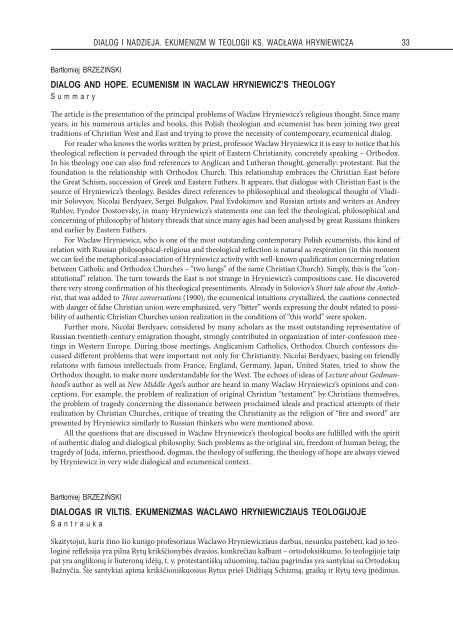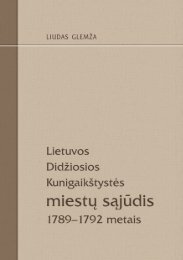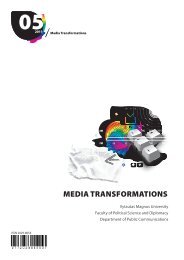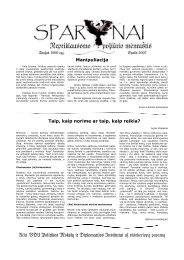Soter Nr. 26 - Vytauto Didžiojo universitetas
Soter Nr. 26 - Vytauto Didžiojo universitetas
Soter Nr. 26 - Vytauto Didžiojo universitetas
You also want an ePaper? Increase the reach of your titles
YUMPU automatically turns print PDFs into web optimized ePapers that Google loves.
Bartłomiej BRZEZIŃSKI<br />
DIALOG I NADZIEJA. EKUMENIZM W TEOLOGII KS. WACŁAWA HRYNIEWICZA<br />
DIALOG AND HOPE. ECUMENISM IN WACLAW HRYNIEWICZ’S THEOLOGY<br />
S u m m a r y<br />
The article is the presentation of the principal problems of Waclaw Hryniewicz’s religious thought. Since many<br />
years, in his numerous articles and books, this Polish theologian and ecumenist has been joining two great<br />
traditions of Christian West and East and trying to prove the necessity of contemporary, ecumenical dialog.<br />
For reader who knows the works written by priest, professor Waclaw Hryniewicz it is easy to notice that his<br />
theological reflection is pervaded through the spirit of Eastern Christianity, concretely speaking – Orthodox.<br />
In his theology one can also find references to Anglican and Lutheran thought, generally: protestant. But the<br />
foundation is the relationship with Orthodox Church. This relationship embraces the Christian East before<br />
the Great Schism, succession of Greek and Eastern Fathers. It appears, that dialogue with Christian East is the<br />
source of Hryniewicz’s theology. Besides direct references to philosophical and theological thought of Vladimir<br />
Solovyov, Nicolai Berdyaev, Sergei Bulgakov, Paul Evdokimov and Russian artists and writers as Andrey<br />
Rublov, Fyodor Dostoevsky, in many Hryniewicz’s statements one can feel the theological, philosophical and<br />
concerning of philosophy of history threads that since many ages had been analysed by great Russians thinkers<br />
and earlier by Eastern Fathers.<br />
For Waclaw Hryniewicz, who is one of the most outstanding contemporary Polish ecumenists, this kind of<br />
relation with Russian philosophical-religious and theological reflection is natural as respiration (in this moment<br />
we can feel the metaphorical association of Hryniewicz activity with well-known qualification concerning relation<br />
between Catholic and Orthodox Churches – “two lungs” of the same Christian Church). Simply, this is the “constitutional”<br />
relation. The turn towards the East is not strange in Hryniewicz’s compositions case. He discovered<br />
there very strong confirmation of his theological presentiments. Already in Soloviov’s Short tale about the Antichrist,<br />
that was added to Three conversations (1900), the ecumenical intuitions crystallized, the cautions connected<br />
with danger of false Christian union were emphasized, very “bitter” words expressing the doubt related to possibility<br />
of authentic Christian Churches union realization in the conditions of “this world” were spoken.<br />
Further more, Nicolai Berdyaev, considered by many scholars as the most outstanding representative of<br />
Russian twentieth-century emigration thought, strongly contributed in organization of inter-confession meetings<br />
in Western Europe. During those meetings, Anglicanism Catholics, Orthodox Church confessors discussed<br />
different problems that were important not only for Christianity. Nicolai Berdyaev, basing on friendly<br />
relations with famous intellectuals from France, England, Germany, Japan, United States, tried to show the<br />
Orthodox thought, to make more understandable for the West. The echoes of ideas of Lecture about Godmanhood’s<br />
author as well as New Middle Ages’s author are heard in many Waclaw Hryniewicz’s opinions and conceptions.<br />
For example, the problem of realization of original Christian “testament” by Christians themselves,<br />
the problem of tragedy concerning the dissonance between proclaimed ideals and practical attempts of their<br />
realization by Christian Churches, critique of treating the Christianity as the religion of “fire and sword” are<br />
presented by Hryniewicz similarly to Russian thinkers who were mentioned above.<br />
All the questions that are discussed in Waclaw Hryniewicz’s theological books are fulfilled with the spirit<br />
of authentic dialog and dialogical philosophy. Such problems as the original sin, freedom of human being, the<br />
tragedy of Juda, inferno, priesthood, dogmas, the theology of suffering, the theology of hope are always viewed<br />
by Hryniewicz in very wide dialogical and ecumenical context.<br />
Bartłomiej BRZEZIŃSKI<br />
DIALOGAS IR VILTIS. EKUMENIZMAS WACLAWO HRYNIEWICZIAUS TEOLOGIJOJE<br />
S a n t r a u k a<br />
Skaitytojui, kuris žino šio kunigo profesoriaus Waclawo Hryniewicziaus darbus, nesunku pastebėti, kad jo teologinė<br />
refleksija yra pilna Rytų krikščionybės dvasios, konkrečiau kalbant – ortodoksiškumo. Jo teologijoje taip<br />
pat yra anglikonų ir liuteronų idėjų, t. y. protestantiškų užuominų, tačiau pagrindas yra santykiai su Ortodoksų<br />
Bažnyčia. Šie santykiai apima krikščioniškuosius Rytus prieš Didžiąją Schizmą, graikų ir Rytų tėvų įpėdinius.<br />
33





